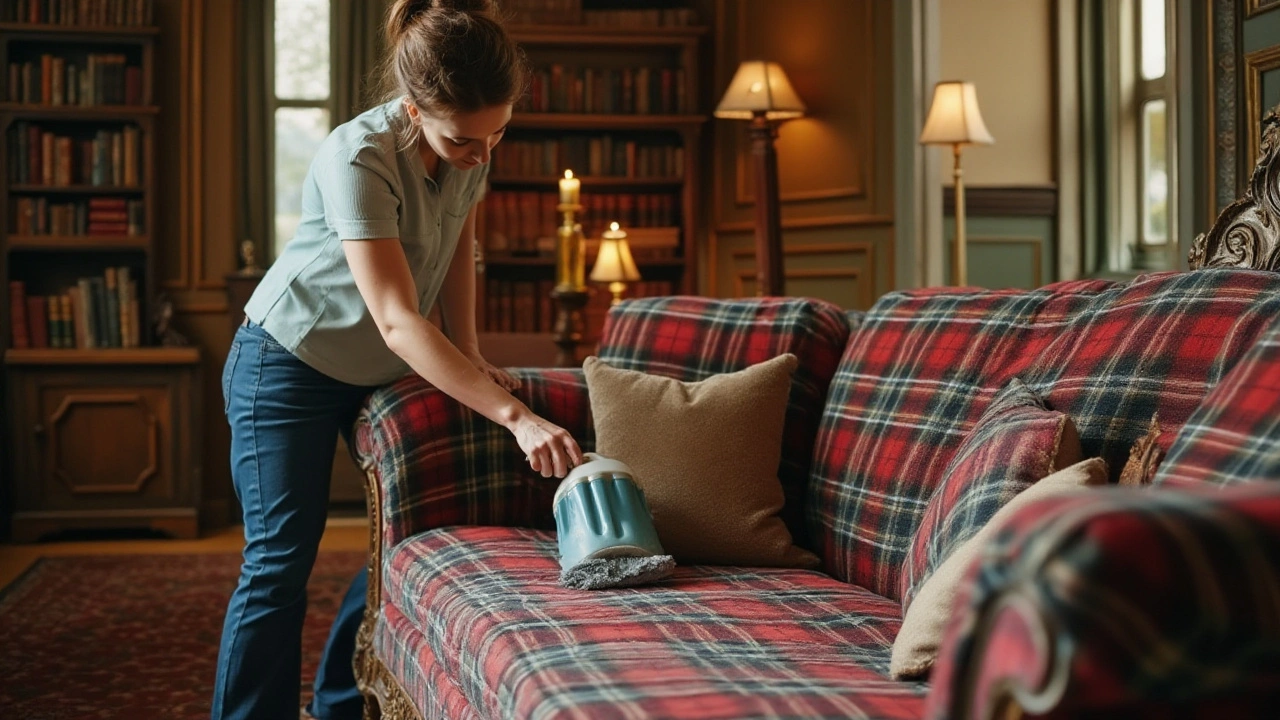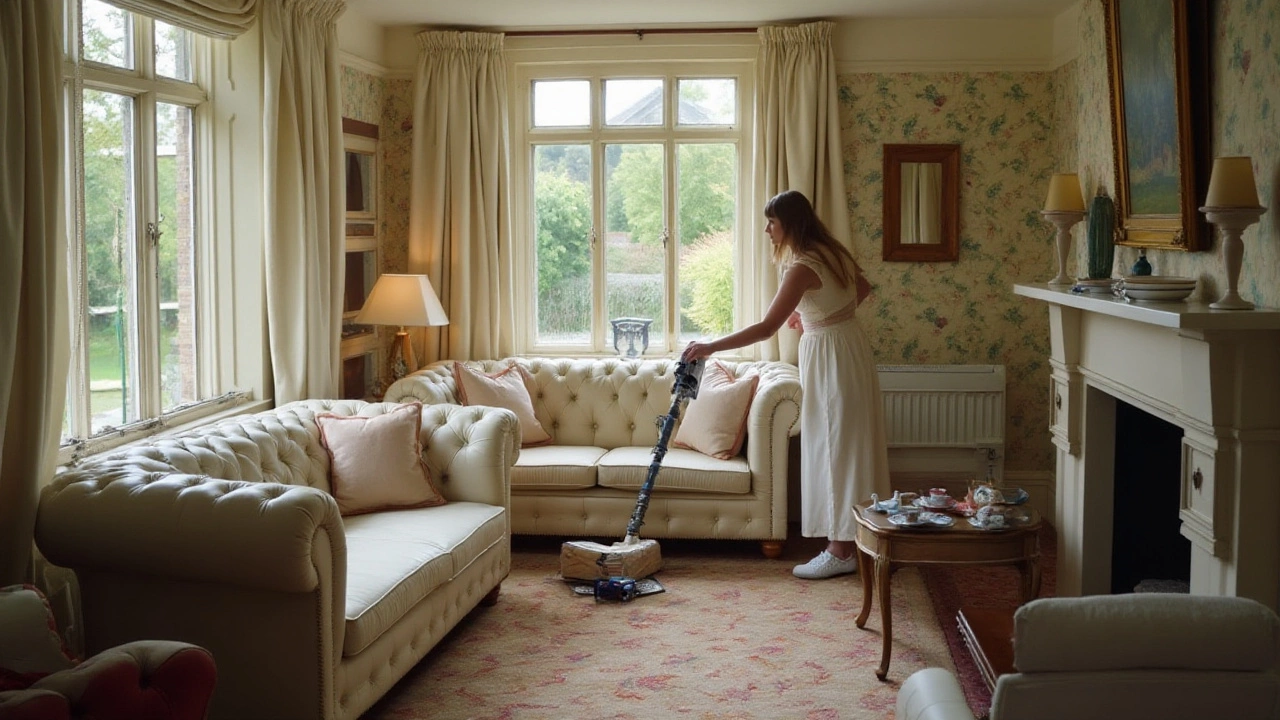Your couch is likely the centerpiece of your living room, offering a cozy spot to unwind after a long day. But just as you wouldn't neglect your floors or shelves, your couch needs regular care to keep it looking fresh and inviting. From spills to everyday dust, it's easy for dirt to accumulate without you noticing.
So, how often should you actually put aside the time to clean it? It's not a one-size-fits-all answer. The frequency can depend on many things, such as the type of fabric, how often the couch is used, and the presence of pets or allergies in your home. Delve further into this article to discover the best practices and useful tips to ensure your couch remains as appealing as the day you bought it.
- Understanding Your Couch Fabric
- Importance of Regular Cleaning
- DIY Cleaning Techniques
- Signs Your Couch Needs Attention
- Professional Cleaning Services
Understanding Your Couch Fabric
When it comes to maintaining your couch, one of the most critical aspects is understanding the fabric it's made of. Different materials require different cleaning methods, and knowing these differences can save you from costly mistakes. For example, natural fibers like cotton or linen can be more susceptible to staining and might require gentler cleaning solutions. On the other hand, synthetic fibers such as polyester or microfiber are usually more durable and resistant to stains, making them easier to clean.
One factor to consider is the fabric's ability to repel or absorb liquids. Some materials have protective coatings that make them water-resistant, while others can immediately soak up spills, leading to stubborn stains. Leather, for instance, is quite popular for its elegance and durability, yet it needs regular conditioning to maintain its look and feel. When it comes to fabric maintenance, remember that prevention is always better than cure. Applying a fabric protector after cleaning can help repel future spills and keep your upholstery looking fresh for longer.
The Role of Fabric Codes
Have you ever noticed small tags with letters like 'W', 'S', 'SW' or 'X' on your couch cushion or under the seats? These are cleaning codes that offer guidance on how to properly clean your upholstery. For instance, a 'W' indicates that water-based cleaning agents are safe, while 'S' means you should use a solvent-based solution. A 'SW' allows for either, and 'X' suggests only vacuuming is applicable. Ignoring these codes may lead to discoloration or damage, impacting not only the appearance but also the longevity of your furniture.
Incorporating regular cleaning routines tailored to your couch fabric ensures that you avoid unnecessary wear and tear. Also, being proactive about dusting and vacuuming prevents grit and grime from embedding into fibers, extending the life of your couch. "Regular cleaning can radically transform the lifespan of your couch, ensuring it remains a beloved part of your home," says Josephine Mayer, a furniture preservation expert.
"Understanding your couch's specific material is like knowing its personality – it guides you in how to take care of it." - Josephine Mayer
Importance of Regular Cleaning
Keeping your couch clean is more than just a matter of aesthetics. A clean sofa enhances the overall ambiance of your living room, providing a welcoming space for family and friends to gather. But the benefits run deeper than just appearances. Regular maintenance is crucial for prolonging the life of your upholstery, especially in homes bustling with activity. Spills and stains are inevitable, and addressing them promptly can prevent long-term damage. Dust, pet hair, and even dead skin cells can accumulate unnoticed over time, leading to unpleasant odors and contributing to poor indoor air quality. The simple act of cleaning your couch regularly can keep allergens at bay and create a healthier home environment.
An overlooked hotspot for germs, couches require cleaning schedules akin to other furniture or household items. According to a survey by the American Cleaning Institute, many people admit they should be more diligent about their cleaning routines but often lack the time. This doesn't undermine the significance because an unkempt couch can be a breeding ground for bacteria, especially with children or pets sharing the space. Practicality dictates that a couch that looks good and smells fresh will be far more comfortable for you and your guests. This nurturing aspect gives each living space its character, and maintaining it can often mean the difference between a cozy night in or opting to entertain elsewhere. By making couch cleaning a regular habit, you're protecting not only your home investment but also promoting comfort and hygiene.
Maintenance goes beyond cosmetic appeal. A rigorously maintained couch supports its structural integrity and extends its lifespan. Professional upholstery cleaners suggest a thorough cleaning at least twice a year, while spot cleaning can be done as necessary. Experts, like those from the International Housewares Association, emphasize that good cleaning habits lead to healthier choices overall. Regular vacuuming, using appropriate cleaners, and considering fabric protection can significantly reduce wear and tear. These are straightforward steps that can be seamlessly integrated into regular cleaning routines. Maintenance practices might also involve rotating cushions to distribute wear evenly, which can be crucial in keeping the fabric looking even and avoiding sagging.
The age-old saying 'Out of sight, out of mind' may lead to overlooking the hidden dirt in couch crevices, but it's essential not to forget these unseen layers. Upholstery tips from fabric care experts often reveal that hidden debris can be surprisingly hefty when ignored over time. Homeowners reported feeling more relaxed and willing to entertain once they learned and practiced the fine art of couch care. This psychological comfort, alongside tangible cleanliness, emphasizes the full impact a clean couch has on your daily experience. Beyond the physical presence, couches are emotional vessels providing solace. A clean couch ensures that every time your family closes the door to the world outside, they retreat into a serene, cared-for environment.

DIY Cleaning Techniques
Cleaning your couch at home can be quite satisfying and doesn't necessarily require a professional touch every time. First and foremost, it's important to recognize the type of fabric your couch is made of. Some materials, like leather and microfiber, demand different upholstery tips than others. Check the manufacturer's instructions, usually found on a tag, to see what's safe and effective for your specific couch. For fabric couches, a simple vacuuming session can do wonders by removing dust, crumbs, and pet hair that settles into the crevices. Use a soft brush attachment to avoid damage, and be thorough, reaching all hidden corners.
If your couch requires a deeper clean, consider creating a mild solution using common household items. Mix equal parts of white vinegar and water, dab it gently onto the stained areas with a soft cloth and let it sit for about ten minutes before blotting it up. This natural remedy is both effective and budget-friendly, addressing stains without harming fabric. But remember to test your cleaning solution on a small, hidden section first to ensure it won't discolor or damage the material.
"Maintaining your sofa regularly can significantly extend its life and keep it looking good. Just like our clothes, upholstery requires attention too." — Upholstery Cleaning Professionals Association
For more stubborn stains or odors, baking soda can be a lifesaver. Sprinkle a generous amount over the affected area and leave it overnight to absorb any smells and dirt. The next day, simply vacuum it away. You'll be surprised by the fresh look and smell of your couch without any heavy-duty chemicals involved. It's a small investment of time for maintaining the cozy heart of any living room.
Of course, don’t forget about the cushion covers. Most are machine washable, but consult the label before tossing them in with your regular laundry. Use a gentle, cold-water cycle and air dry them to prevent shrinking. Keep in mind that consistent cleaning is important, especially if the couch is a constant hub of activity in your home. By incorporating these home care strategies, your couch will continue to offer comfort and warmth for years to come.
If you're dealing with leather or suede, these materials require a more delicate approach. For leather, a soft, damp cloth can wipe away surface debris, followed by a leather conditioner to keep the material supple. Suede, on the other hand, benefits from a specialized suede brush, which helps restore the nap and remove dry stains. Again, using the right tools and methods specific to your couch's material is crucial for effective fabric maintenance.
Signs Your Couch Needs Attention
A well-cared-for couch is not only a testament to good housekeeping but also contributes significantly to the vibe of a room. While a cursory glance might suggest it’s in good shape, subtle signs often signal the need for a more thorough cleaning session. One of the most telling indicators is a stale or unusual odor emanating from the fabric. This smell can develop from accumulated dust, pet hair, or even spilled liquid that hasn't been properly cleaned, all of which can settle in the upholstery over time without you noticing.
Besides odors, visible stains on the upholstery are a glaring hint that some upkeep is required. From the obvious wine mark to the murkier mystery spots perhaps left by a sticky toddler's fingers, these blemishes disrupt the fabric's aesthetic harmony. Moreover, looking beyond the surface can reveal more sinister signs—like dark patches that can suggest the presence of mold or mildew, particularly in humid environments. What is less visible to the eye but noticeable to those with pets are shredded threads or tiny scratches, common in homes with lively cats or dogs. Therefore, it's important to conduct regular checks on different sides of cushions or along seam lines where dirt loves to hide.
If you find yourself sneezing more often in your living room, the culprit may not be pollen. Upholstery is a major trap for allergens like dust mites, which can have a cozy little home inside your couch. Long periods without a cleaning ritual not only diminish your couch's softness but also can compromise air quality in your home. Studies have shown that soft furnishings such as couches can account for a substantial amount of airborne allergens.
As David Reaudo, an expert in household cleanliness, once remarked, "A couch is more than just furniture; it's a memory repository. Keep it inviting by giving it the care it deserves."Notice, too, that sagging cushions or a noticeable change in the couch's comfort level, are another call to action. Over time, the filling in the cushions can degrade, not just due to use but also because of cumulative dirt and moisture. This can mean not only an uncomfortable seat but potentially diminutive structural integrity, putting a strain on the couch frame.
Don’t overlook the color change in your couch fabric. Fading can occur as much from sun exposure as from grime. If you observe one part of the couch looking distinctly different in color compared to more sheltered areas, don't ignore it. It might be time for a cushion flip or rotating the piece in your room. Keeping track of even minor shifts helps keep your couch a cherished part of your home. Spot these signs early to prevent wear and tear that goes beyond simple repair, ensuring that your couch remains comfy and stylish for years.

Professional Cleaning Services
The thought of cleaning your couch can be daunting, especially if you're dealing with tough stains or delicate fabrics. This is where professional cleaning services come into play. These experts have the right tools and knowledge to tackle even the nastiest of dings on your beloved sofa. Engaging a professional can ensure your couch receives a deep clean, which might be difficult to achieve through DIY methods. They use specialized equipment that not only cleans the surface but also penetrates deep into the fabric, removing dirt, allergens, and bacteria that are hidden out of sight.
A professional cleaning service often starts with an assessment of your upholstery type. Different fabrics require different cleaning solutions and techniques. For instance, natural fibers like cotton may need a gentler approach compared to synthetic materials like polyester. The processes employed by cleaning services can range from steam cleaning to dry cleaning, depending on what your couch fabric demands. Choosing the right method ensures the longevity and vibrancy of your sofa, delaying the need for costly replacements or repairs.
According to a survey by the Home Cleaning Health Network, regular professional cleanings can extend the life of your furniture by up to five years. They also found that approximately 78% of homeowners who engaged professional services reported noticeable improvements in the appearance and smell of their couches. It's fascinating to note that while many individuals see professional cleaning as a luxury, it is, in fact, an investment in maintaining a healthy home environment. Clean couches mean fewer allergens and bacteria, contributing to the well-being of everyone in the household.
Before choosing a professional service, it's essential to do a bit of homework. Look for companies that are certified by industry bodies, as this certification is a good indicator of their proficiency and reliability. Reading reviews and asking for recommendations can also help you make an informed choice. Additionally, don't hesitate to ask potential cleaning services about their process and the solutions they use. Eco-friendly and non-toxic solutions are more prevalent today, appealing to environmentally conscious consumers.
For those who are particularly concerned about sustainability, numerous companies now offer green cleaning options. These involve using plant-based, biodegradable solutions that are both safe for your family and kind to the planet. Choosing such services enables you to enjoy a clean couch without compromising on your values. It's a win-win situation that keeps your home fresh while supporting the global shift towards greener living.
"A well-maintained couch not only enhances the aesthetics of your home but also reflects the care you put into creating a healthy and inviting space," says James Tarrington, a renowned interior designer. "It's an investment that pays off in personal comfort and style."
